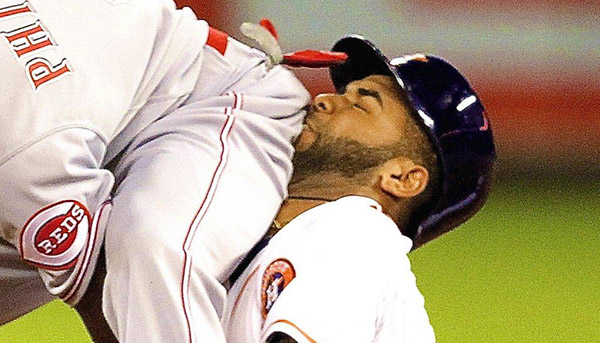MLB Embracing Next Competitive Advantage: Mental Skills

“If you can’t quantify it, people tend to disregard it.” —Terry Francona
As sabermetrics continue to act as the foundation for most MLB front offices, many people are wondering what the next competitive advantage will be. Nutrition? Sleep? Injury prevention?
The answer is leaning toward mental performance. About two-thirds of MLB teams currently have mental skills coaches working with players. Each front office essentially has the same objective, which is to find players and accurately project their numeric outcomes. Every MLB team is looking at the same spreadsheet now. The sabermetric movement is over. Someone already figured that out (again, congrats to Billy Beane and Paul DePodesta). If every team has 25 talented players who’re saddled with projected numbers, what makes them different from each other? The answer could be HOW those players achieve those projections.
This type of service didn’t even exist amongst MLB teams until the 1980’s. Harvey Dorfman was one of the pioneers of mental skills training in Major League Baseball. He was the mental skills coach for two championship teams: 1989 Oakland A’s and the 1997 Florida Marlins. He also served as a mentor for several pitchers, including Greg Maddux, Roy Halladay, Al Leiter and Jamie Moyer. He was the author of The Mental Game of Baseball and several other mental performance books.
Currently, Bob Tewksbury is the Mental Performance Coach for the San Francisco Giants. He won a total of 110 games in his MLB career with the New York Yankees, Chicago Cubs, St. Louis Cardinals, Texas Rangers, San Diego Padres and Minnesota Twins. After his playing career, Tewksbury received his Masters Degree in Sports Psychology and won three World Series Championships with the Boston Red Sox as their mental skills coach.
So, what exactly is a mental skills coach?
It’s someone who works on the mental aspect of the game from the standpoint of applied sports psychology. That includes confidence, concentration, relaxation techniques, imagery, goal setting, journaling and self-talk.
In his book, Ninety Percent Mental, Tewksbury talks about the stigma of mental skills training from a player’s perspective. At the minor league level, mental skills coaching is a lot easier. Players are more open-minded because they’ll do anything they can to get to the majors. However, during his time at the major league level, the number of clients tends to shrink because the players feel like they don’t need it.
That machismo mentality is why we see power hitters choosing not to bunt against the shift. It’s also why Wilt Chamberlain refused to shoot the ball underhanded on his free throws. According to the Washington Post piece from 2016, Rick Barry, former NBA player, was an early adopter and now, strong advocate of the underhanded shot for people like Dwight Howard, Shaq, and other notoriously poor free throw shooters because it heavily increases their shooting percentage. They refused to adopt the “granny” shot because as Chamberlain states in his biography, “I felt silly, like a sissy.”
Players don’t want to look weak. However, what they don’t realize is that there is power in being vulnerable and open-minded, especially when it increases their performance on the field. Isn’t that the ultimate goal!?
Even sabermetric institutions like the MIT Sloan Sports Analytics Conference have tried to quantify the mental skills game in their article, In Search of David Ross.
“One of the biggest adjustments I ever saw was Theo Epstein going from the sabermetrics guy to somehow in 2004 realizing, ‘Hey there’s an intangible here. I don’t know what it is. I can’t quantify it, but if we don’t have it, we’re not going to win.’” —Curt Schilling, Whatever It Takes Podcast
Mental skills training has impacted the careers of several MLB players like Jon Lester, Anthony Rizzo and Andrew Miller.
Tewksbury’s work with Lester involved using an audio program to help him relax and stay in the moment. The audio goes through different pitches in different situations, simulating the inner monologue of a pitcher during a game.
“I always had a problem, and I still have a problem, which is, I get too far ahead of myself.” —Jon Lester, Ninety Percent Mental
An hour before the game, Lester would go to a quiet room in the clubhouse, put this audio track on and fall asleep.
“Okay, the count is 0 and 2, right-handed hitter, fastball hitter, your pitch is a perfect fastball down and away … and the umpire balls it. It should have been a strike. So now, instead of a strikeout, the count is 1 and 2. This is what you should do next. This is how you should react.” —Ninety Percent Mental
Most people are aware of Lester’s problem of throwing to first base. Tewksbury really didn’t notice it during his time with the Red Sox because in the American League, teams don’t run as often. However, the problem became much more evident when Lester came over to the National League. I was curious as to why Tewksbury didn’t have a special mental solution to fix this problem. What he did have was some interesting analysis on the issue. Through all of this, what he thinks people don’t realize is how unbelievably effective Lester is even with this problem. It’s amazing that he’s still able to focus, repeat his delivery, and block out the negative comments about his throwing issue. “That’s true mental toughness”, says Tewksbury.
When Anthony Rizzo was coming up in the Red Sox organization, everyone knew that he would be a good major league hitter. When he was drafted in the sixth round in 2007, he became one of the earlier adopters of Tewksbury’s mental skills audio program. It’s something he still uses today.
There are 11 tracks on the program, but one of the most important is Track 3: Goals and Expectations. Especially in today’s game, baseball players are measured by numbers such as OBP, Batting Average, RBIs, Wins, Loses, etc. Each player at the MLB level usually has high expectations and sets lofty goals like, “I want to hit .330 with 30 home runs and over 100 RBIs.”
What’s more beneficial for the player is to set “process” goals instead. This tactic can be applied to any sport. An example for a hitter would be, instead of hitting .300, you focus on the daily routine of how that can be achieved. This would involve getting up at 7 a.m., hitting off a tee, studying the pitcher, looking at video, hitting live batting practice, seeing the baseball and focusing on being more relaxed at the plate. This type of repetition and process helps clear the mind and takes the pressure off a player who must hit .300.
Negative thoughts continue to plague the full potential of athletes. Psychologist Dr. Judith Beck calls them “automatic thoughts.” In his book, Tewksbury refers to these thoughts as “The Little Man,” which he experienced himself as a pitcher. It’s a negative voice that sits on your shoulder and says things like “I hope you don’t screw this up. You’re probably not going to get out of the first inning. You’ve got nothing.”
Andrew Miller also suffered from “The Little Man” early in his career. When the Red Sox acquired the left-hander in a 2010 trade, Tewksbury implemented positive self-talk to overcome his problem. Miller had been a highly touted prospect who was the third overall pick in the 2006 MLB Draft. After some bad outings and mechanical issues, Miller lost his confidence. Over the course of spring training in 2011, Tewksbury worked on developing “anchor statements” to combat Miller’s negative thinking.
Because the belief in yourself fluctuates as you go through a long MLB career, Tewksbury implemented a variety of statements to keep Miller positive and grounded in his true ability. Miller would repeatedly say to himself prior to games: “I trust and believe in my stuff … I consistently see myself throwing strikes. I’ve done it before, I will do it again.” As he put this into practice, Miller’s performance drastically improved with Red Sox. He would go on to become one of the most dominate relief pitchers in the game, almost winning a World Series for the Cleveland Indians in 2016.
“You effect change from the inside out.” — Bob Tewksbury, Ninety Percent Mental
We have to remember that these players are human beings. I think that’s often forgotten about when we see them play and expect a certain outcome. While the advances of technology and data are abundant in today’s game, expect a shift back to the human element.

























